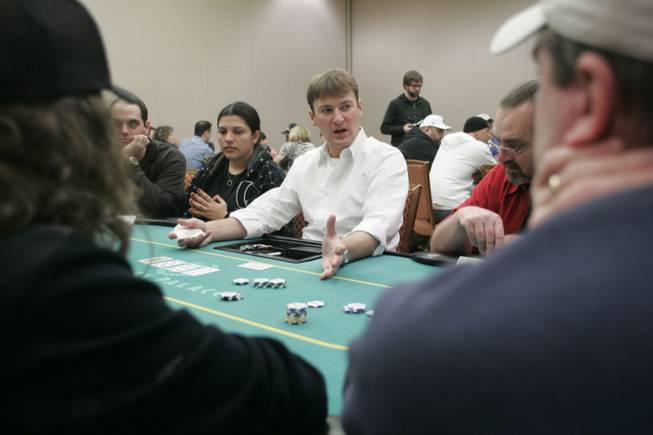
Poker professional Alex Outhred gives pointers Saturday at the World Series of Poker Academy’s clinic on cash games. Fifty students paid $1,899 each to learn from pros including Outhred, Mark Seif, Mark Gregorich and Michael Gracz.
Tuesday, Feb. 10, 2009 | 2 a.m.
Sun Archives
- A poker survival skill: Cash game play (2-4-2009)
- Wit, wisdom in the highs and lows (1-6-2009)
- A lively mix of players on poker show, all big bettors (12-24-2008)
In the dealer’s perch for once, rather than in his familiar position in a player’s seat, Mark Seif was shuffling a deck of cards and holding court at a poker table in a Caesars Palace ballroom.
One of the participants in last weekend’s World Series of Poker Academy, a two-day instructional camp focusing on no-limit Texas hold ’em cash games, had just asked about the possibility of learning optimal strategy through a chart listing which starting hands to play from various positions.
The essence of Seif’s reply: It wouldn’t work in no-limit hold ’em. Although such charts are commonly used in teaching limit hold ’em, the no-limit version of the game contains many more nuances, rendering the by-the-number, chart-based approach ineffective.
Here’s a more powerful technique, Seif explained as he dealt the next hand. The “live hand demonstration” portion of the poker academy allows the participants to play out sample hands just as they would in a live cash game, and provides for a dissection of the action afterward that touches on important facets of poker theory.
Seif was one of four poker professionals serving as instructors for the latest World Series of Poker Academy, along with Alex Outhred, Mark Gregorich and Michael Gracz. This was only the second camp — and the first in Las Vegas — to focus on Texas hold ’em cash games rather than tournaments, and it drew more than 50 participants. The cost was $1,899 — typical for the seminars, which regularly sell out.
The students arrived with varying levels of talent and experience but with a similar goal: to sharpen their skills and ultimately make more money in no-limit cash poker games.
In the ensuing sample hand dealt by Seif, the flop revealed two 3s and a 10. Two players went to war, and it turned out one guy was holding pocket aces against his opponent’s pocket 4s.
Seif’s postmortem of the hand was illuminating. He had no problem with the pocket 4s raising the aces’ postflop bet. After all, that flop probably missed a lot of hands. But Seif did take issue with the 4s calling after the guy with aces thought about it for half a second before re-raising all-in.
One table over, Outhred was analyzing a hand he had just dealt. It was fine for a limper to enter the pot with pocket 6s, although a case could also be made for raising in that spot. Raising from the position of one behind the button with king-8 suited? Well, it’s not a play Outhred would normally make, though he seemed satisfied with the player’s explanation that she sensed weakness from her opponent and figured she could take the pot down right there. Calling that raise on the button with ace-5 offsuit, however, was a mistake, Outhred said. It’s a hand that can run into all sorts of trouble if an ace happens to flop.
“It’s OK,” Outhred said. “That’s why we’re here, to talk about this stuff.”
Sunday’s session concluded with a discussion of all 30 hands in a tough test of no-limit hold ’em play all of the participants took on a computer. The pro instructors as well as the students often disagreed among themselves on the correct course of action on certain hands. Seif, a former prosecutor for the district attorney’s office in Los Angeles, demanded logically coherent explanations rather than just “right” answers to the problems.
Overall, the participants’ scores on the test were substantially higher here at Caesars than they were at the first cash game academy last month in Atlantic City, Seif said.
In fact, in Seif’s estimation at the conclusion of the camp, 90 percent of those in the room were already better than 90 percent of the players in a typical $2-$5 no-limit hold ’em game on the Strip.
After two days of detailed, hard-core poker teaching, Seif and his colleagues wrapped up the camp with some more far-reaching advice.
“Always be a student,” he said. “The game is changing at this moment.”
How you act at a poker table, Outhred said, can be seen as a microcosm of how you deal with other people in society at large.
“The better you get, the more ‘bad beats’ you’re going to take,” Outhred said. “There’s no point in getting grumpy. Don’t let that happen to you. Enjoy yourself, challenge yourself. If you enjoy this game and you enjoy making the best decisions you can, the ‘bad beats’ and the ugly stuff won’t really matter.”

Join the Discussion:
Check this out for a full explanation of our conversion to the LiveFyre commenting system and instructions on how to sign up for an account.
Full comments policy